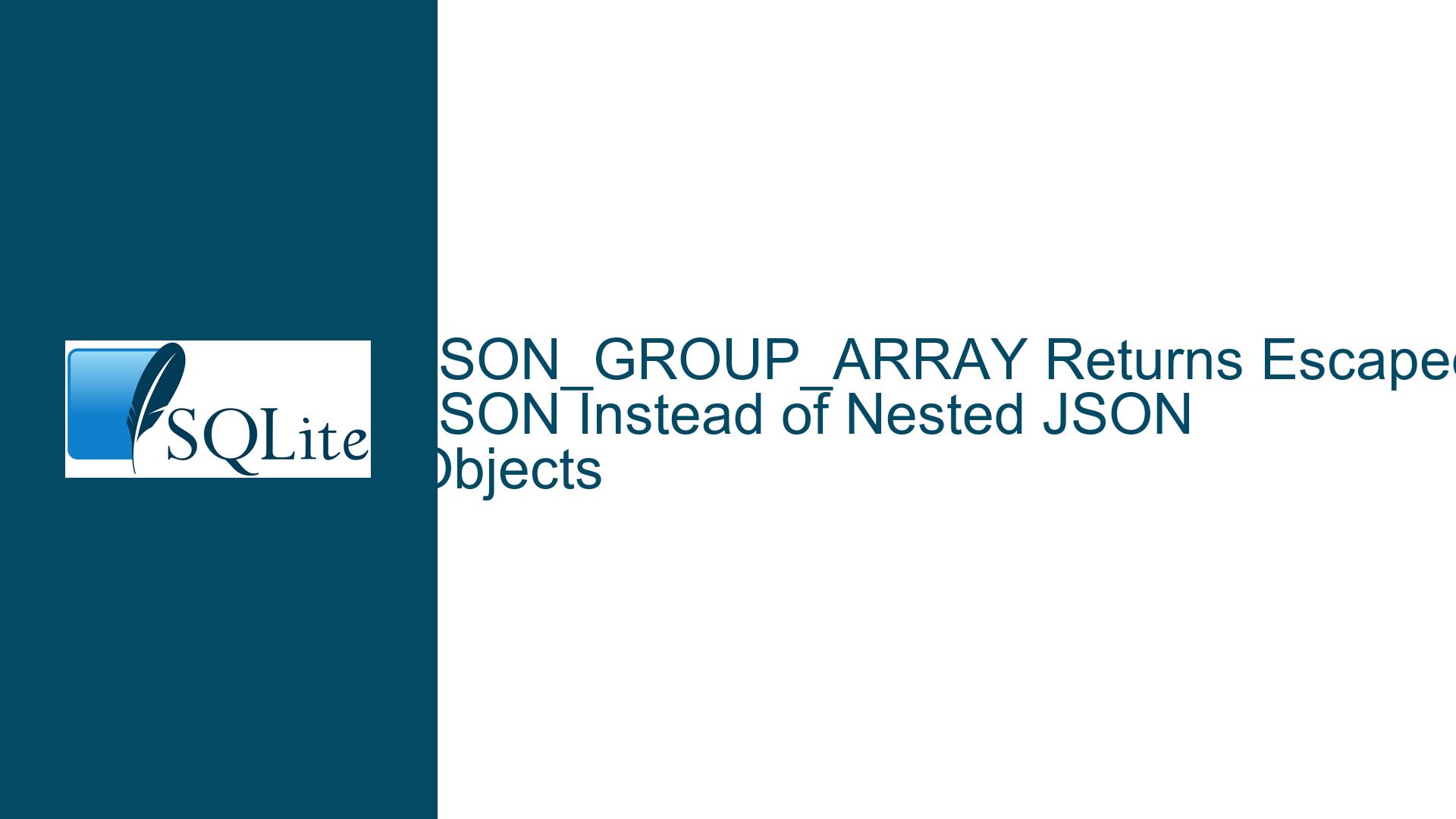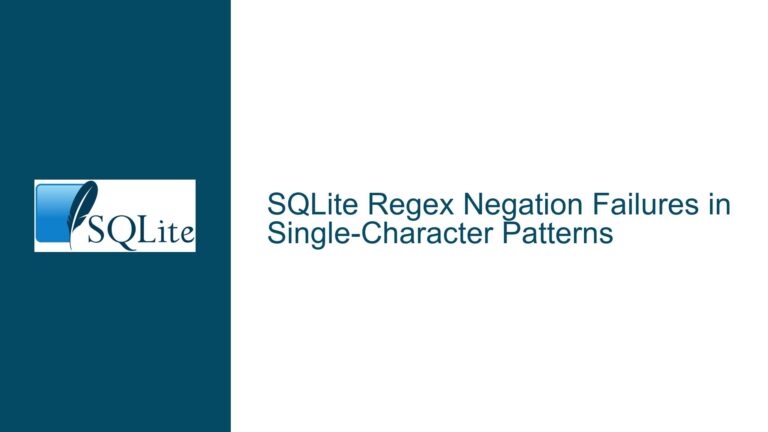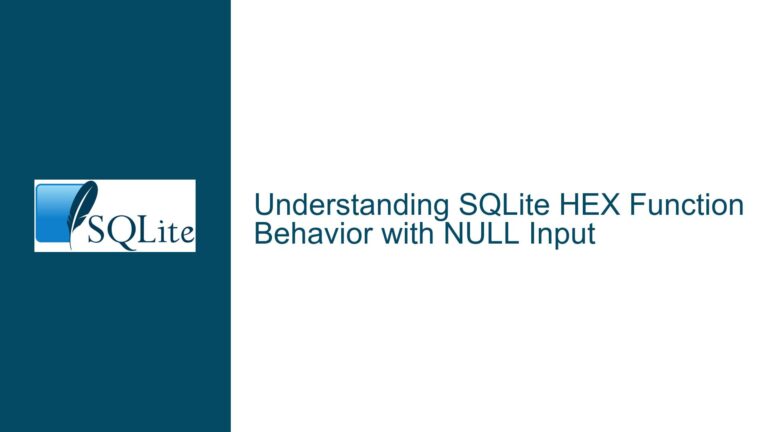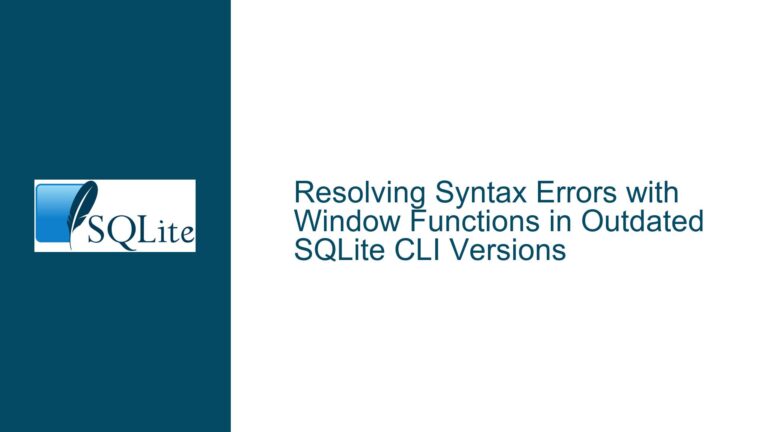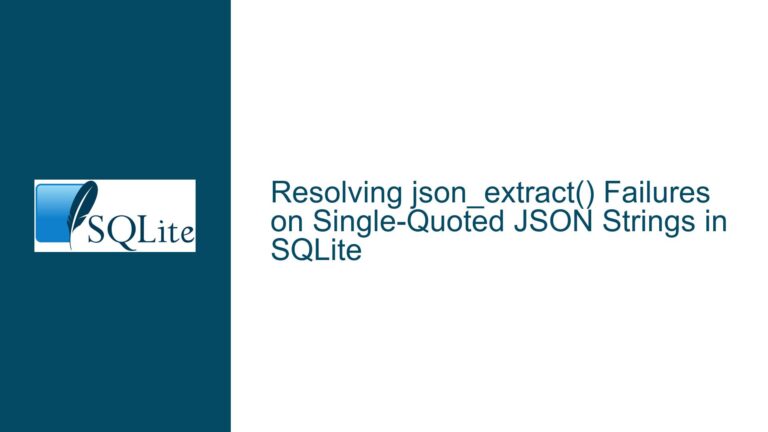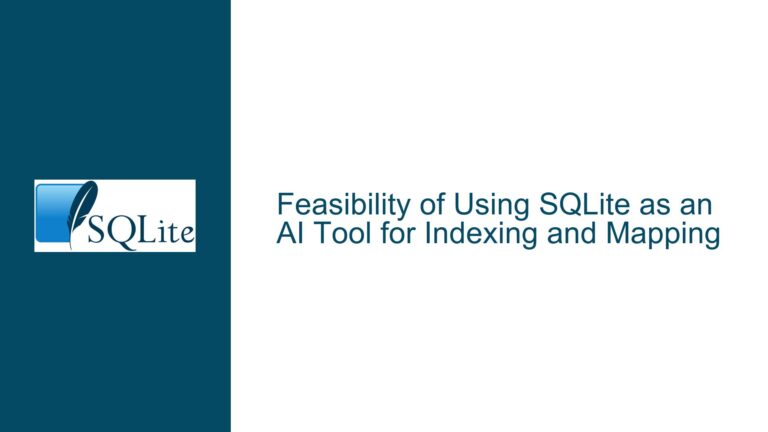JSON_GROUP_ARRAY Returns Escaped JSON Instead of Nested JSON Objects
JSON_GROUP_ARRAY Misinterprets JSON Strings as Plain Text
The core issue revolves around the behavior of the JSON_GROUP_ARRAY function in SQLite when it processes JSON objects stored as text. Specifically, when JSON_GROUP_ARRAY is applied to a view that returns JSON objects, the function treats the JSON objects as plain text strings rather than nested JSON structures. This results in escaped JSON strings within the array, which is not the expected behavior. For example, instead of producing an array of JSON objects like [{"key": "value"}], the output becomes ["{\"key\": \"value\"}"], where the JSON objects are treated as escaped strings.
This behavior stems from SQLite’s lack of a native JSON datatype. JSON data is stored as plain text, and SQLite’s JSON functions cannot inherently distinguish between a JSON object and a plain text string. When JSON_GROUP_ARRAY receives input from a view or another source that outputs JSON as text, it defaults to treating the input as a string, leading to the escaped output. This issue is particularly noticeable when working with views that encapsulate JSON object creation, as the JSON objects are serialized into text before being passed to JSON_GROUP_ARRAY.
Backward Compatibility Constraints and JSON Function Assumptions
The root cause of this behavior lies in SQLite’s historical design decisions. When the SQLite file format was designed in 2004, JSON was not a widely used data interchange format, and no provision was made for a dedicated JSON datatype. As a result, JSON data is stored as plain text, and SQLite’s JSON functions must operate under the assumption that any text input is a string unless explicitly informed otherwise. This backward compatibility constraint means that functions like JSON_GROUP_ARRAY cannot automatically infer that a text string contains JSON data.
When JSON_GROUP_ARRAY receives input from another JSON function, it can correctly interpret the input as JSON. However, when the input comes from a view or a column that stores JSON as text, the function defaults to treating the input as a plain string. This behavior is consistent across most JSON functions in SQLite, as they are designed to handle text inputs conservatively to avoid unintended side effects. The lack of a native JSON datatype exacerbates this issue, as there is no way to explicitly mark a text field as containing JSON data.
Solutions: Using JSONB_OBJECT or Explicit JSON Parsing
There are two primary solutions to this issue, both of which involve explicitly informing SQLite that the input to JSON_GROUP_ARRAY is JSON data. The first solution is to use the JSONB_OBJECT function instead of JSON_OBJECT within the view. The JSONB_OBJECT function produces a binary representation of the JSON object, which JSON_GROUP_ARRAY can correctly interpret as JSON rather than plain text. This approach ensures that the JSON objects are not serialized into text before being passed to JSON_GROUP_ARRAY, avoiding the escaped string issue.
The second solution is to use the JSON function to explicitly parse the JSON text before passing it to JSON_GROUP_ARRAY. By wrapping the view’s output in the JSON function, you inform SQLite that the text contains JSON data, allowing JSON_GROUP_ARRAY to correctly interpret it. For example, the query SELECT JSON_GROUP_ARRAY(json(accounttype)) FROM json_account_types_view; ensures that the accounttype column is treated as JSON rather than plain text. This approach is more flexible and can be applied to any scenario where JSON data is stored as text.
Both solutions effectively address the issue by ensuring that JSON_GROUP_ARRAY receives properly formatted JSON input. The choice between using JSONB_OBJECT or the JSON function depends on the specific use case and the structure of the database. In general, the JSON function is the more versatile solution, as it can be applied to any text field containing JSON data, while JSONB_OBJECT is specific to views that generate JSON objects.
Detailed Troubleshooting Steps and Fixes
To resolve the issue of JSON_GROUP_ARRAY returning escaped JSON strings, follow these detailed steps:
Identify the Source of the JSON Data: Determine whether the JSON data is being generated within the query or retrieved from a view or table. If the data is coming from a view or table, ensure that the JSON objects are stored as text and not as binary data.
Check the View Definition: If the JSON data is generated by a view, inspect the view definition to see how the JSON objects are created. For example, in the provided discussion, the view
json_account_types_viewuses theJSON_OBJECTfunction to generate JSON objects. This is a common source of the issue, as theJSON_OBJECTfunction outputs text by default.Modify the View to Use JSONB_OBJECT: If the view is the source of the JSON data, consider modifying it to use the
JSONB_OBJECTfunction instead ofJSON_OBJECT. This function produces a binary representation of the JSON object, whichJSON_GROUP_ARRAYcan correctly interpret. For example, update the view definition as follows:CREATE VIEW json_account_types_view (accounttype) AS SELECT JSONB_OBJECT( 'Name', name, 'Description', description, 'Normal Multiplier', NormalMultiplier, 'Contra Multiplier', ContraMultiplier, 'Sort Order', SortOrder ) FROM accountTypes;This change ensures that the JSON objects are not serialized into text before being passed to
JSON_GROUP_ARRAY.Use the JSON Function to Parse JSON Text: If modifying the view is not feasible, use the
JSONfunction to explicitly parse the JSON text before passing it toJSON_GROUP_ARRAY. For example, update the query as follows:SELECT JSON_GROUP_ARRAY(json(accounttype)) FROM json_account_types_view;This approach informs SQLite that the
accounttypecolumn contains JSON data, allowingJSON_GROUP_ARRAYto correctly interpret it.Verify the Output: After applying the fix, verify that the output of
JSON_GROUP_ARRAYmatches the expected format. The JSON objects should be nested within the array, and the escaped string issue should be resolved.Update Documentation and Best Practices: If this issue is encountered in a team or project environment, update the documentation to include this solution. This will help other developers avoid the same issue and ensure consistent handling of JSON data.
By following these steps, you can resolve the issue of JSON_GROUP_ARRAY returning escaped JSON strings and ensure that JSON data is correctly interpreted and formatted in your SQLite queries.
